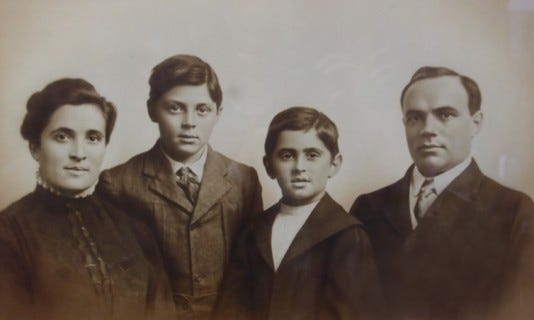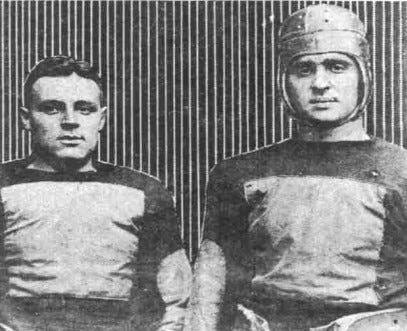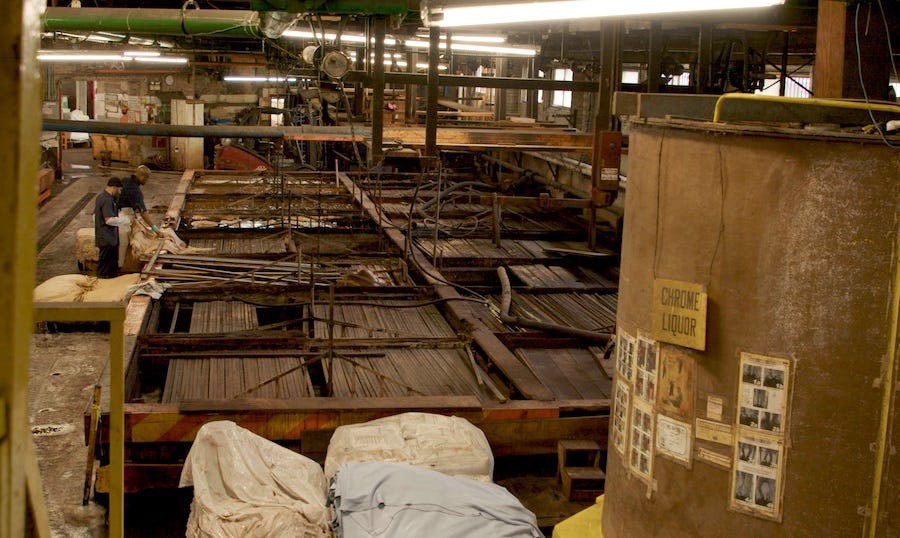Today's Tidbit... The Horween Brothers and the NFL
The best parts of some stories are the links to seemingly unrelated stories that make perfect sense once you understand how the connections came about. That is the case with the tale of Ralph and Arnold Horween, brothers from Chicago born before the last century turned. Like many Americans then and now, they were the sons of immigrants. Their father, Isadore Horween, learned the tanning process in Ukraine before emigrating to America, arriving in Chicago in time for the 1893 World's Fair, and then working in Chicago tanneries until he opened his own in 1905.

Horween Leather gained a reputation for its quality, leading many of America's finest shoemakers to use their products. As the business grew, Isadore sent his sons to private schools and then to Harvard, where both were athletes whose greatest success came on the gridiron. Two years older than Arnold, Ralph was a field goal-kicking fullback whose 35-yard boot was all Harvard needed to beat Princeton in 1916, helping him earn honorable All-American honors. WWI intervened, leading to two years aboard several Navy vessels, but he returned in time to play football in 1919 and 1920.

Arnold captained Harvard's freshmen team in 1916 and their informal squad in 1917 when many students were in the service. He spent time as a Navy cadet at Harvard before entering active service with Naval Aviation. Both returned to campus to play in 1919 and 1920, with Arnold earning first-team All-American honors both years at running back as Harvard went 9-0-1 and 8-0-1. The 1919 team played one more game than the 1920 squad because they spent New Year's Day in Pasadena, beating Oregon 7-6. Ralph dislocated his shoulder in the first quarter and missed the rest of the game, but Arnold's running and extra point conversion helped Harvard to victory.

After graduating, the brothers returned to Chicago, where they played for the Racine Cardinals of the American Professional Football Association, a league that morphed into the NFL in 1922. Both played under assumed names in 1921 and 1922 to keep their mother from learning they played pro football when the league had a rough-and-tumble reputation. Playing football for Harvard was one thing. Playing pro football was another.

However, they came clean in 1923 when Arnold became the player-coach of the renamed Chicago Cardinals, figuring they could no longer keep his identity a secret. Ralph played his last season in 1923 and Arnold in 1924. Both returned to Harvard in the latter half of the 1920s. Ralph went to law school, graduating in 1929, while Arnold was Harvard's head football coach from 1926 through 1930. Harvard went 20-17-3 during his tenure, beating Yale in his last three years in Cambridge.

After leaving football coaching behind, Arnold returned to Chicago to join the family business. A tannery that began producing leather for strops to sharpen straight razors continued expanding and finding new customers.
George Halas, the owner of the Chicago Bears, was instrumental in another Chicago-based company, Wilson Sporting Goods, becoming the exclusive supplier of footballs to the NFL in 1941. Halas, whose Bears beat the Cardinals all three times the teams met when he and Arnold were player-coaches, approached his old rival in the late 1940s, asking if he could improve the leather used for NFL footballs. The request led Arnold to develop the Tanned in Tack® tanning process, which helps the leather retain its pebbling longer and improves the ball's feel. During the second half of the 1950s, Horween Leather became Wilson's exclusive supplier of leather for NFL balls, a relationship they have maintained ever since. After earning the Wilson business, Arnold continued running Horween Leather until retiring a year before he died in 1985.
His brother Ralph also worked for Horween Leather at times but primarily practiced law before turning to raising cattle in Virginia. The lifestyle must have suited him. In 1996, he became the first former NFL player to reach 100 years of age, living another 296 days before passing away in 1997.
Today, Horween Leather is run by the fourth and fifth generations of the family and supplies leather to brands ranging from Allen-Edmonds to Shinola to Timberland. In addition to providing leather for Rawlings baseball gloves and Wilson's NFL footballs, they also supply Wilson with the leather for NBA basketballs.
While Arnold and Ralph Horween were sons of immigrants, few stories are more American than theirs.
Football Archaeology is reader-supported. Click here to buy one of my books or otherwise support the site.


